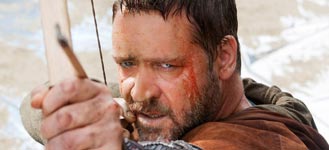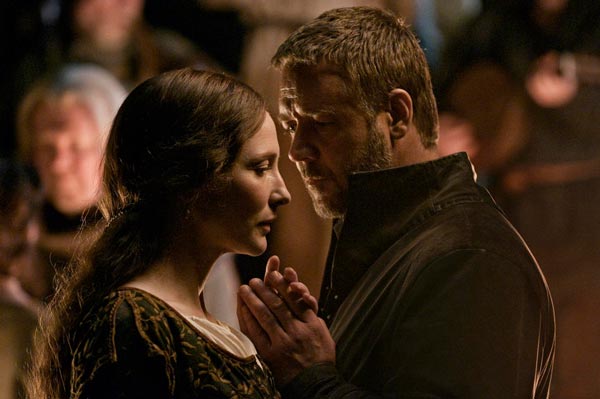Robin Hood (Universal)
Apparently, we’ve had it wrong all along.
To take from the rich and give to the poor, as a classic understanding of the Robin Hood tale might suggest, was not an attempt by the benevolent marksman to redistribute the wealth of his land.
In Ridley Scott’s eponymous origin fable, working from a script by Brian Helgeland, Robin Hood is no socialist; he is a staunch champion of liberty and democracy.
The setting is a late-12th century England, and filth pervades the landscape. The mud-soaked battlefield, a spectacular siege of spears, arrows, rocks, and fire, unfolds before stone-laden castles and keeps.
Inside, palatial proceedings are smeared with back-stabbing, treachery, and frivolity—the machinations of big crowns on even bigger heads. When the freshly-appointed King John (Oscar Isaac) earns recompense for disgracing his mother (Eileen Atkins), the crack of her palm upon his cheek echoes like the thrust of a sword splintering through a wooden shield.
While John is drunk on power and the carnal contributions of his French mistress (Léa Seydoux), a scheming advisor named Godfrey (Oscar Isaac, as steely and sinister as ever) aligns himself with French forces to undermine the English effort.
The political backdrop is truly no more complex. That it’s plotted so intricately, framed with ornate titles heralding various (and irrelevant) locations, plays like a contradiction. The medieval intrigue of Robin Hood is not a calculated chess match; it’s a raucous swirl of personal affronts, underhanded dealings, and gluttonous pursuits—a well-dressed soap opera of the highest caliber (and, by many counts, with a lot less soap).
In this world of greed and self-preservation, Robin Hood the man (Russell Crowe), here a burly English soldier named Robin Longstride, begins as such: with personal interests foremost in mind. To escape the potential heft of wartime injustice, he and his closest comrades, yet to be christened as “merry men,” assume the identities of fallen knights and ride to their adopted home base of Nottingham.
Longstride considers that knights are but men with extra adornments—that their greater stake in social standing is illusory at best. Then he tours Nottingham, barren and impoverished by tithes and taxes, while reckless royals throw riches and casualties toward self-serving conquests.
When the blind, aging Sir Walter Loxley (Max von Sydow) takes Longstride in as his own (Longstride arrives in the guise of Loxley’s son), an important truth emerges for our titled hero. Human value is defined by action and character—not by appearance (immaterial to a man without sight) or some arbitrary decree.
No one embodies this sentiment more than Sir Loxley’s daughter-in-law Marion, played by the ever-illustrious Cate Blanchett. A woman and a widow, though not a maid by any stretch, Marion hesitates not to impress her concern and disgust upon Nottingham’s weaselly Sheriff (Matthew Macfadyen) and noncommittal religious brethren. Had she somehow the means, she would surely have seen to a more righteous reign (though Queen Elizabeth, played twice on film by Blanchett, would not come to power for another three-and-a-half centuries).
Marion welcomes Robin at first with an appropriately jaded reluctance. But he soon earns her trust through shared misgivings over the authoritarian state, and by the film’s end (and as legend would have it), he also earns her heart.
Russell Crowe gives Robin Hood a softer core beneath his tree-trunk physique, without disembarking from the solemnity he carries as a seasoned soldier. Though even during the bolder moments of his transformation from infantryman to arrowed avenger, his demeanor alters only slightly.
When England sends out her call to arms against the French, Robin Longstride answers with a finely-tuned appreciation for the human condition—for our rights as people and equality as individuals. Ridley Scott ingeniously stages a climactic battle along the shores of Normandy—recalling the beach landings on D-Day in WWII—but not before Robin has negotiated terms with King John to preserve the rights of his fellow countrymen—shades of the Magna Carta and, perhaps moreso, our own Bill of Rights.
For Robin Longstride, known to us now as Robin Hood, was a democrat, a patriot, a protector of the people against autocratic rule. He took from the rich and gave to the poor, but only to return all possessions to their rightful owners.
In the fray of battle, he aims his deadliest darts at the ones in power: the oppressors and breeders of corruption. This fact persists through the longest slogs of plot (admittedly, there are a few), embedding the tale with a relatable and admirable fervor. And Robin Hood emerges an historical hero—reimagined and reinvigorated.

Directed by Ridley Scott. Written by Brian Helgeland.
Rated PG-13 for violence including intense sequences of warfare, and some sexual content.
Runtime is 2 hours, 20 minutes.
Tickets & Showtimes» Watch the Trailer» Visit the Website»






Leave a Reply
You must be logged in to post a comment.